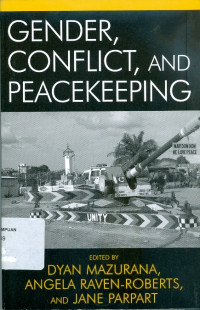
Text
Gender, conflict, and peacekeeping
The contributors to this book emphasize the role of gender in the intersection of armed conflict, complex political emergencies, and peacekeeping and humanitarian operations. They examine the historical and current debates, efforts, and obstacles regarding the mainstreaming of gender in peacekeeping and humanitarian operations.Peacekeeping has become a major international undertaking throughout the world, from Africa to the Americas, from Europe to Southeast Asia. Yet until now, there has been no systematic analysis of the key role of gender in post-cold war conflicts and of post-conflict peacekeeping efforts. This groundbreaking volume explores how gender has become a central factor in shaping current thinking about the causes and consequences of armed conflict, complex emergencies, and reconstruction. Drawing on expertise ranging from the highest levels of international policymaking down to the daily struggle to implement peacekeeping operations, this work represents the full span of knowledge and experience about international intervention in local crises. Presenting a rich array of examples from Angola, Bosnia Herzegovina, East Timor, El Salvador, the former Yugoslavia, Guatemala, Haiti, Kosovo, Liberia, Mozambique, Namibia, Rwanda, and Serbia, the authors offer important insights for future peacekeeping and humanitarian missions. This volume explores how gender has become a central factor in shaping current thinking about the causes and consequences of armed conflict, complex emergencies, and reconstruction. It represents a span of knowledge and experience about international intervention in local crises. Presenting examples from Angola, Bosnia, East Timor, El Salvador, the former Yugoslavia, Guatemala, Haiti, Kosovo, Liberia, Mozambique, Namibia, Rwanda, and Serbia, the authors offer insights for future peacekeeping and humanitarian missions. (Oxfam Development Resource Review)
This invaluable study makes compelling linkages between the political use of gender in conflict and peacekeeping and the blurring of the lines between victims, perpetrators, and combatants in today's wars. It is a must for activists, academics, policymakers, and the general public in our militarized world. (Ariane Brunet, women's rights coordinator, International Centre for Human Rights and Democratic Development)
Availability
| KP.II.000256 | KP.II MAZ g | My Library | Available |
Detail Information
- Series Title
-
-
- Call Number
-
KP.II MAZ g
- Publisher
- Lanham : Rowman & Littlefield Publishers., 2005
- Collation
-
ix, 304p. ; 24cm.
- Language
-
English
- ISBN/ISSN
-
0742536327
- Classification
-
KP.II
- Content Type
-
-
- Media Type
-
-
- Carrier Type
-
-
- Edition
-
-
- Subject(s)
- Specific Detail Info
-
-
- Statement of Responsibility
-
-
Other version/related
No other version available
File Attachment
Comments
You must be logged in to post a comment
 Computer Science, Information & General Works
Computer Science, Information & General Works  Philosophy & Psychology
Philosophy & Psychology  Religion
Religion  Social Sciences
Social Sciences  Language
Language  Pure Science
Pure Science  Applied Sciences
Applied Sciences  Art & Recreation
Art & Recreation  Literature
Literature  History & Geography
History & Geography